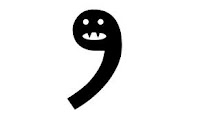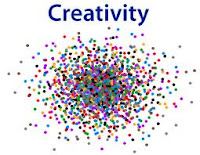 I've been making a ton of comma mistakes lately, so I just wanted to post a few helpful tips that I've found on using commas. I recently heard a brilliant writer say that commas still intimidate him, which made me feel a little better about my own comma usage. Still, the more correct my writing can become the first go around, the less time my revision will take (which is taking me a very long time at the moment). By the way, I'm not sure if I used a comma correctly in that last sentence.
I've been making a ton of comma mistakes lately, so I just wanted to post a few helpful tips that I've found on using commas. I recently heard a brilliant writer say that commas still intimidate him, which made me feel a little better about my own comma usage. Still, the more correct my writing can become the first go around, the less time my revision will take (which is taking me a very long time at the moment). By the way, I'm not sure if I used a comma correctly in that last sentence.
From the Purdue Online Writing Lab
When to use a comma
Introductory elements often require a comma, but not always. Use a comma in the following cases:- After an introductory clause.
- After a long introductory prepositional phrase or more than one introductory prepositional phrase.
- After introductory verbal phrases, some appositive phrases, or absolute phrases.
- If there is a distinct pause.
- To avoid confusion.
When not to use a comma
Some introductory elements don't require a comma, and sometimes the subject of a sentence looks like an introductory element but isn't. Do not use a comma in the following cases:- After a brief prepositional phrase. (Is it a single phrase of fewer than five words?)
- After a restrictive (essential) appositive phrase. (See our document on appositives.)
- To separate the subject from the predicate. (See below.)
Preparing and submitting his report to the
committee for evaluation and possible publication[x] was one of the most
difficult tasks Bill had ever attempted.
To start a new business without doing market research and long-term planning in advance[x] would be foolish.
Extracting the most profit for the least expenditure on labor and materials[x] is the primary goal of a capitalist.
From the New York Times
“Comma splice” is a term used for the linking of two independent clauses — that is, grammatical units that contain a subject and a verb and could stand alone as sentences — with a comma. When I started teaching at the University of Delaware some years ago, I was positively gobsmacked by the multitude of comma splices that confronted me. They have not abated.
Here’s an example:
He used to be a moderate, now he’s a card-carrying Tea Partier.
It’s easy to fix in any number of ways:
He used to be a moderate. Now he’s a card-carrying Tea Partier.
He used to be a moderate; now he’s a card-carrying Tea Partier.
He used to be a moderate, but now he’s a card-carrying Tea Partier.
He used to be a moderate — now he’s a card-carrying Tea Partier.
How to choose among them? By reading aloud — always the best single piece of writing advice — and choosing the version that best suits the context, your style and your ear. I would go with the semicolon. How about you?
Two particular situations seem to bring out a lot of comma splices. The first is in quotations:
“The way they’ve been playing, the team will be lucky to survive the first round,” the coach said, “I’m just hoping someone gets a hot hand.”
The comma after “said” has to be replaced with a period.
The other issue is the word “however,” which more and more people seem to want to use as a conjunction, comparable to “but” or “yet.” So they will write something like:
The weather is great today, however it’s supposed to rain tomorrow.
That may be acceptable someday. Today, however, it’s a comma splice. Correct punctuation could be:
The weather is great today, but it’s supposed to rain tomorrow.
Or
The weather is great today. However, it’s supposed to rain tomorrow.
Comma splices can be O.K. when you’re dealing with short clauses where even a semicolon would slow things down too much:
I talked to John, John talked to Lisa.
Samuel Beckett was the poet laureate of the comma splice. He closed his novel “The Unnamable” with a long sentence that ends:
… perhaps it’s done already, perhaps they have said me already, perhaps they have carried me to the threshold of my story, before the door that opens on my story, that would surprise me, if it opens, it will be I, it will be the silence, where I am, I don’t know, I’ll never know, in the silence you don’t know, you must go on, I can’t go on, I’ll go on.Which goes to show, I suppose, that rules are made to be broken.
One Last Cheatsheet
http://www.jalc.edu/departmentpages/english/pdfs/write_place_tutorials/33_common_uses_for_the_comma.pdf
There are a few ways you can be a hero and support AJ. Free things are: try Audible or AmazonPrime for 30 days, link to us a social network like Twitter, Facebook or Reddit, or download and rate the podcast in iTunes. If you have a little spare money you can send a Paypal donation to ajsnookauthor@gmail.com, buy one of AJ's Kindle eBooks, or buy anything on Amazon by going through the site. Thanks so much for your support, AJ










 There is something about a good meditation that makes one feel like he has melding in with the setting, like he has become all that he is conscious of. A good writer needs to be able to put himself in the shoes of his readers, to know which parts of the setting to describe and which to leave untouched. Meditation and creativity, or shall I say presence of mind and creativity, are linked at the core. Reading
There is something about a good meditation that makes one feel like he has melding in with the setting, like he has become all that he is conscious of. A good writer needs to be able to put himself in the shoes of his readers, to know which parts of the setting to describe and which to leave untouched. Meditation and creativity, or shall I say presence of mind and creativity, are linked at the core. Reading 
